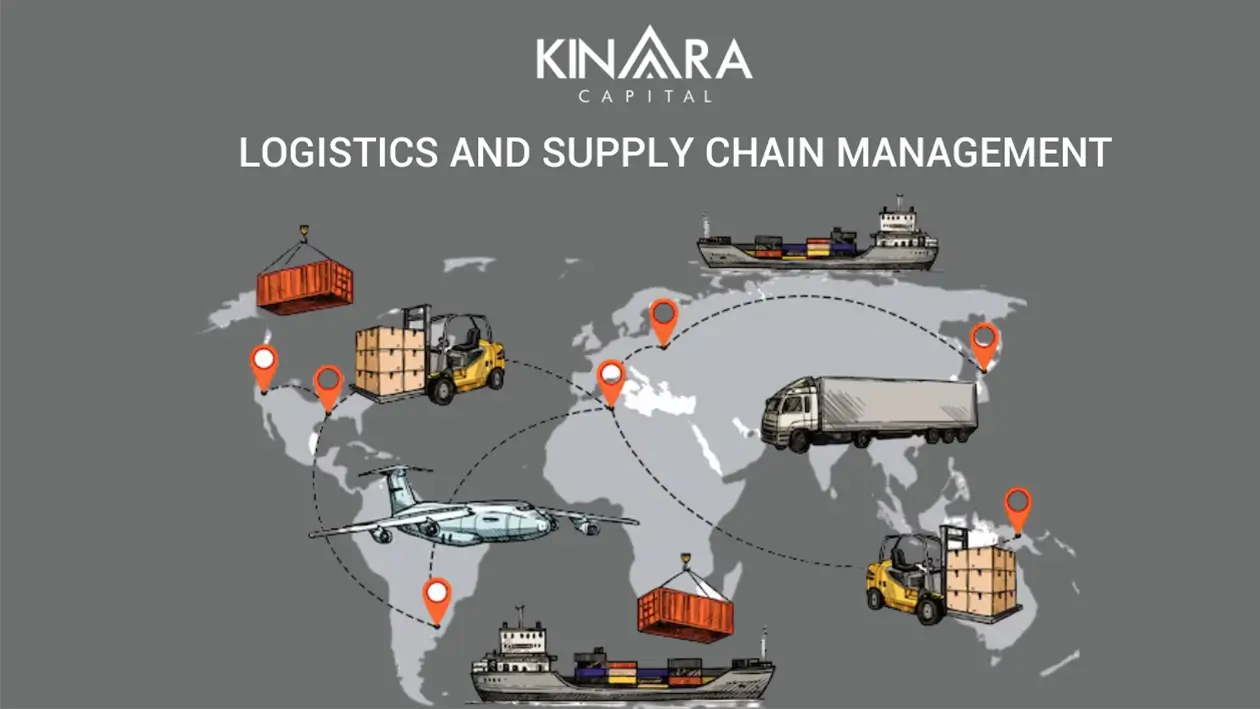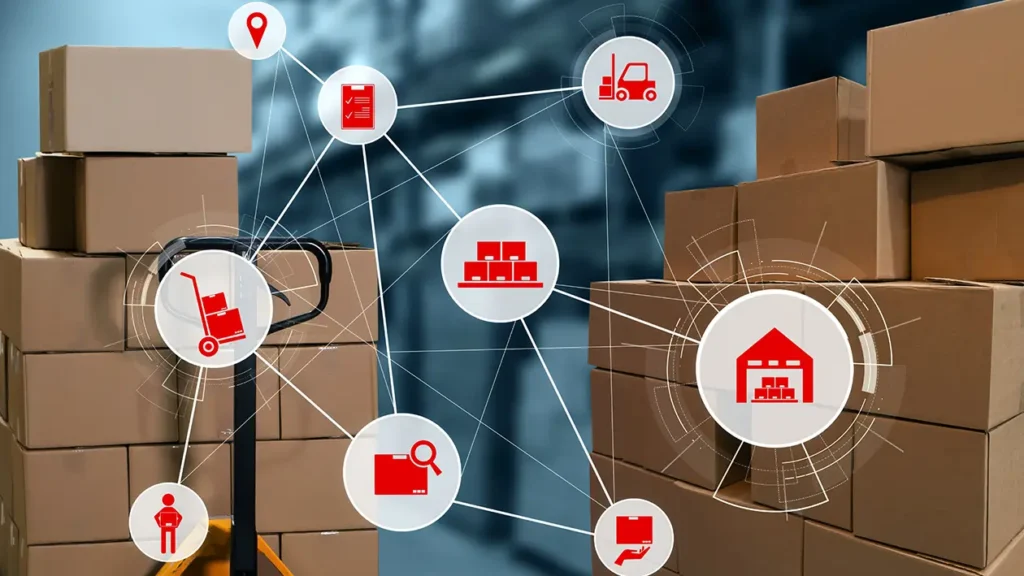
The Micro, Small, and Medium Enterprises (MSME) sector is the backbone of the Indian economy, accounting for over 30% of the country’s GDP and employing over 111 million people. The logistics and supply chain industry is a key enabler for the MSME sector, as it provides the essential services that allow MSMEs to get their products to market.
According to a report from India Brand Equity Foundation (IBEF), the contribution of the logistics industry to India’s GDP is about 14.4%, which is equivalent to about $250 billion in economic activity each year. The industry is also a major employer in India, providing jobs to over 22 million people.
Logistics is the process of planning, organising, and managing the flow of goods and services from the point of origin to the point of consumption. It includes activities such as transportation, warehousing, inventory management, and packaging.
Supply Chain Management (SCM) is the broader term that encompasses all of the activities involved in the movement of goods and services from suppliers to customers. It includes logistics, but it also includes other activities such as procurement, manufacturing, and marketing.
This blog will discuss how MSMEs can improve their efficiency in logistics and supply chain management. It will also discuss the support from the Government of India and NBFCs in the growth of the logistics and supply chain management industry. Before explaining it, let’s explore the Importance, challenges and future of Logistics and Supply Chain Management.
Logistics and supply chain management are two of the most important functions in any business. They are responsible for ensuring that products are delivered to customers in a timely and efficient manner. Well-managed logistics and supply chain can help businesses to save money, improve customer satisfaction, and gain a competitive edge. The industry is also a major driver of economic growth, as it helps to facilitate the movement of goods and services throughout the country.
The logistics and supply chain industry in India is a complex and fragmented market with a wide range of players, including large multinational companies, MSMEs, and informal players. The industry faces a number of challenges, including high transportation costs, inadequate infrastructure, and a lack of skilled manpower.
Despite these challenges, the logistics and supply chain industry in India is growing rapidly, and MSMEs are playing an increasingly important role in the sector. MSMEs are well-positioned to take advantage of the growth opportunities in the logistics and supply chain industry, as they are often more agile and responsive to change than larger companies.

Logistics and supply chain management is a complex and challenging field as it involves the coordination of a large number of moving parts. A typical supply chain can involve dozens or even hundreds of different organisations, each with its own unique needs and requirements. This can make it difficult to coordinate and optimise the entire process. Businesses that can effectively manage their logistics and supply chain operations can improve efficiency, reduce costs, and improve customer service. However, there are several challenges that businesses face in this area. Some of the challenges that businesses face include:
The supply chain is a complex network of organisations and processes that delivers goods and services from suppliers to customers. It is often global in scope, involving multiple countries and cultures. This complexity can make it difficult to manage the supply chain effectively, leading to errors, inefficiencies, and disruptions.
Logistics and supply chain management can be expensive, involving the cost of transportation, warehousing, and other expenses. This can put a strain on the budget of the business and make it difficult to compete in the marketplace.
The global economy and geopolitical factors introduce uncertainties that can significantly impact businesses. Volatility, changes, and geopolitical events create an environment of unpredictability, making it challenging for businesses to plan for the future and adapt to evolving circumstances.
Logistics and supply chain management involve various risks, including natural disasters, political instability, and cyberattacks. These risks can cause reputational damage, financial losses, and operational disruptions. To safeguard against these risks, businesses must have robust contingency plans in place.
The logistics and supply chain industry is constantly evolving. New technologies are always emerging, which can create new challenges and opportunities. This means that supply chain managers need to be constantly learning and adapting to stay ahead of the curve. This can be a challenge for businesses with limited resources and can lead to a competitive disadvantage.
The global economy is becoming increasingly interconnected, and businesses are looking for ways to optimise their logistics and supply chains to meet the demands of this new era. Some of the trends that are expected to shape the future of logistics and supply chain management include:
E-commerce is growing rapidly, and this is having a major impact on the logistics and supply chain industry. Businesses need to be able to adapt to the demands of e-commerce, such as faster shipping times and shorter lead times.
Omnichannel retailing is becoming increasingly popular, as customers want to be able to shop online, in-store, or through a combination of channels. While new-age tech holds great potential, omnichannel retailing creates new challenges for logistics and supply chain managers. They need to be able to coordinate shipments across multiple channels like WhatsApp, Instagram, via text, etc.
Automation is playing an increasingly important role in logistics and supply chain management. Robots are being used for tasks such as picking and packing, and artificial intelligence is being used to optimise transportation routes and inventory levels.
By understanding these trends, businesses can prepare for the challenges and opportunities that lie ahead.

MSMEs can use technology to improve their efficiency and productivity. For example, they can use cloud-based logistics software to track shipments, manage inventory, and communicate with suppliers and customers. They can use technology to improve their efficiency and productivity to compete with larger businesses and grow their market share.
MSMEs need to understand the needs of their customers and tailor their logistics and supply chain operations accordingly. This includes ensuring that products are delivered on time, in good condition, and at a competitive price. It will help them build strong relationships with their customers.
Partnering with third-party logistics (3PL) providers can be a great way for MSMEs to improve their supply chain management and grow their businesses. 3PL providers have a wealth of experience in managing supply chains, as well as access to resources that MSMEs may not have, such as warehouses, transportation, and IT systems. 3PL can also provide services at a lower cost, which can help MSMEs to save money and focus on their core business activities.
MSMEs need to track their inventory levels closely to avoid stockouts and overstocks. This can be done manually or using a barcode scanner or RFID system. Stockouts can lead to lost sales and customer dissatisfaction, while overstocks can be costly and lead to write-offs.
If the supply chain is disrupted, it can be difficult for MSMEs to replenish their inventory levels efficiently, leading to further disruptions. By tracking their inventory levels closely, MSMEs can mitigate the risks associated with supply chain disruptions and protect their businesses.
MSMEs can improve efficiency and reduce errors by standardising their processes. This involves developing standard operating procedures (SOPs), using common tools and software, and training employees on the same processes.
SOPs can help to ensure that tasks are performed in the most efficient way possible and consistently, which can help to improve efficiency and reduce errors. By standardising their processes, MSMEs can improve the way they operate and deliver their products and services.
MSMEs can optimise routes to reduce transportation costs and improve delivery times. This could include things like using route planning software, consolidating shipments and working with carriers to negotiate better rates.
Upskilling helps employees improve their understanding of logistics and supply chain management. This will help them to make better decisions and to identify and mitigate risks.
By following these strategies, MSMEs can improve their participation in logistics and supply chain management activities. It can strengthen their market position and gain various growth opportunities in the industry.
The Government of India has recognised the critical role of logistics and supply chain management in driving economic growth and has taken several initiatives to support their development. Here are some key ways in which the government has provided support:
The government has focused on improving transportation infrastructure, including roads, railways, ports, and airports. Initiatives such as the Bharatmala Project, Sagarmala Project, and Dedicated Freight Corridors aim to enhance connectivity and reduce logistics costs.
The introduction of the Goods and Services Tax (GST) has simplified and streamlined the tax structure, resulting in a more efficient movement of goods across state borders. This has eliminated multiple checkpoints and reduced paperwork, leading to faster transit times and cost savings.
The Make in India initiative aims to boost domestic manufacturing and promote India as a global manufacturing hub. The government has introduced favourable policies, tax incentives, and eased regulations to attract investments and facilitate the growth of manufacturing industries, thereby stimulating the demand for logistics and supply chain services.
The government has formulated a National Logistics Policy to create an integrated and comprehensive framework for the logistics sector. The policy aims to address key challenges, promote digitisation, develop multimodal logistics parks, improve efficiency, and reduce logistics costs.
The government has provided support to e-commerce companies and start-ups in the logistics sector. Initiatives like Startup India, Digital India, and the promotion of e-commerce have facilitated the growth of logistics technology solutions, last-mile delivery services, and innovative supply chain models.
The government has launched various skill development programs to enhance the capabilities of the workforce in the logistics and supply chain sector. These programs focus on providing industry-specific training, promoting entrepreneurship, and bridging the skill gap in the sector.
The government’s Foreign Trade Policy includes measures to facilitate exports and imports, simplify customs procedures, and promote trade facilitation. These initiatives aim to enhance the efficiency of cross-border trade and support the growth of international logistics and supply chain operations.
These supportive measures by the Government of India have created an enabling environment for the growth of logistics and supply chain management. They have contributed to improving infrastructure, simplifying processes, fostering innovation, and enhancing the competitiveness of Indian businesses in the global marketplace.
Non-Banking Financial Companies (NBFCs) play a significant role in supporting logistics and supply chain management. The NBFC sector provides crucial financial services and solutions to businesses in this sector as well as businesses across the board, which fuels the sector’s growth.
One of the key contributions of NBFCs is providing working capital finance to logistics and supply chain companies. These businesses often face cash flow gaps due to delayed payments, inventory costs, and operational expenses. NBFCs, like Kinara Capital, offer flexible and customised business loans to logistics businesses that fall into the MSME category. They can acquire MSME loan options such as short-term loans, invoice discounting, and supply chain finance. It helps bridge the working capital needs and ensure smooth operations.
MSMEs play a crucial role in the logistics and supply chain management sector. These smaller businesses contribute to the overall efficiency, innovation, and competitiveness of the industry. MSMEs bring diversity and healthy competition to the market, driving economic growth and creating job opportunities.
By collaborating with partners, adopting technology, improving skills, conducting market research, ensuring supply chain visibility, adhering to regulations, optimising operations, continuously improving, adopting sustainable practices, and exploring new markets, MSMEs can enhance their impact in the logistics and supply chain space.
With support from the government, industry associations, and stakeholders, MSMEs have the potential to transform the sector, making it more resilient and dynamic. Their growth and success are instrumental in the growth and success of the entire industry. Therefore, recognising and empowering MSMEs is essential for a robust and thriving logistics and supply chain ecosystem. Their growth and success have a direct impact on the economic growth of the country. That’s why Kinara Capital, a leading fintech firm in India, plays a vital role. MSMEs in the logistics industry and other small businesses in India that rely on their services consider Kinara as a great partner to finance the growth of their businesses.
Kinara addresses the challenges faced by MSMEs in accessing formal credit. They adopted a unique approach that considers the financial health and potential of the business, leveraging technology and data-driven methodologies for faster loan approvals and disbursements. With a focus on last-mile connectivity, Kinara Capital operates through 133 branches, bringing financial services directly to MSMEs. This localised presence allows them to understand the specific needs of businesses and offer required financial solutions.
Kinara Capital offers collateral-free business loans for various purposes like working capital, business expansion, equipment purchase, and technology adoption. By providing timely and accessible financing, they support MSMEs in achieving growth, generating employment, and contributing to local economies.
Utilising technology, Kinara Capital streamlines loan application and approval processes using a proprietary credit assessment model that combines traditional and alternative data sources. This enables faster decision-making and disbursals, reducing the time and effort required for MSMEs to access funds.
To apply for collateral-free business loans from Kinara Capital MSMEs can check their eligibility in 1-minute from myKinara App. Eligible business owners can complete the entire application process to disbursement within 24-hours, enabling swift access to funds. Additionally, requires minimal documentation, simplifying the MSME loan process. Kinara also provides doorstep customer service to MSMEs. Also, we have a dedicated customer support team available between Monday – Friday (9.30 AM – 6.00 PM) at our toll free number 1800-103-2683 for any questions or assistance. This ensures that entrepreneurs can get the help they need throughout the loan process.
